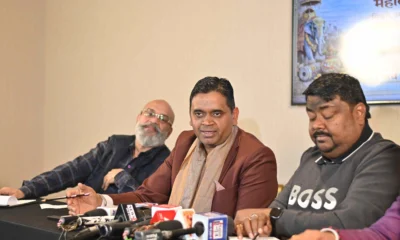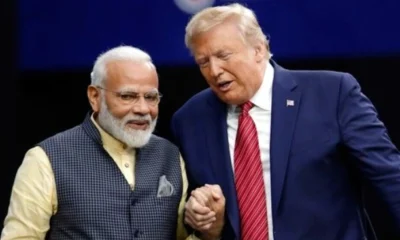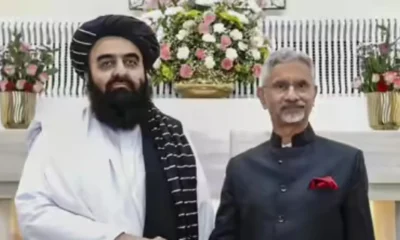The first minister-level meet of Quadrilateral Strategic Dialogue (“the Quad”) between India, Australia, Japan and the US took place on Thursday, Sep 26 on the sidelines of the UN General Assembly (UNGA) in New York.
The Quad is seen as a bid by the four largest democracies of Indo-Pacific to counter China’s growing economic and political clout.
Significant shift in India’s approach
The minister-level meet is a significant change for India which, till last year, had refused to upgrade the Quadrilateral grouping with the US, Australia and Japan from join secretary to foreign secretary level. India has been hesitant about the Quad, in part because it does not want to isolate China and because it has had a history of staying clear of security alliances. The Quad, revived in November 2017, had so far met at the level of Joint Secretary-rank officials and the Thursday meet upgrades it by at least three levels.
The concept of the Quad was first generated more than a decade ago during the George W Bush administration before it went into a hiatus. Its recent revival reflects growing unease over Chinese President Xi Jinping’s more assertive foreign policy.
Present at the Thursday meet to discuss the Indo-Pacific strategy were India’s External affairs minister S Jaishankar, Japanese foreign minister Toshimitsu Motegi, US secretary of state Mike Pompeo and Australia’s Marise Payne.
“Thank you #Quad Foreign Ministers @SecPompeo @moteging Aand @MarisePayne,” tweeted Jaishankar.
Pompeo tweeted: “Positive meeting with @MarisePayne, @DrSJaishankar, and @moteging. We discussed our shared interest in building a free and open #IndoPacific, denuclearization of #NorthKorea, and joint efforts to promote regional stability.”
Payne tweeted: “I met today in New York with my counterparts from the US, Japan and India to discuss our efforts to maintain and promote an open, prosperous and inclusive Indo-Pacific, and reaffirm our #Quad commitment to shared values and cooperation.”
After this, there has been no official statement from India on the meet.
Australian Foreign Affairs Minister Marise Payne said in an emailed statement: “The ‘Quad’ countries reaffirmed their commitment to shared values and cooperation on maritime security, infrastructure and connectivity in support of rules-based frameworks.”
They discussed efforts to “maintain and promote an open, prosperous and inclusive Indo-Pacific”, and agreed to hold regular ministerial meetings, she said.
Issues discussed at the meeting
A senior US State Department official, according to The Hindu, told reporters in New York that the Ministers “met to discuss collective efforts in our shared commitments and close cooperation on counter terrorism, mentoring, assistance in disaster relief, airtime security, cooperation, development, finance and cybersecurity efforts.”
The high-level meeting “demonstrates a shared commitment of our respective leadership to institutionalise this gathering of like-minded Indo-Pacific partners,” a second official present at the briefing said. The official then suggested that “formalise” was a more apt description than “institutionalise”.
On India’s role
The State Department official emphasised India’s role: “If I could single out India’s role in the quad, I think it highlights India’s leadership in the end of the Pacific region. It’s one of the many ways that the U.S. and India are now cooperating closely on shared strategic objectives.”
About what had changed this year with regard to India’s participation, The Hindu quoted the official as saying, “There’s recognition that, you know, in the past we didn’t have that similar like-mindedness necessarily among the four partners and over the past two years, you know, we’ve been able to demonstrate what’s changed.”
“We have a shared evaluation of those security threats and the threats facing the region when countries don’t have options to develop in a sustainable and free manner. And that’s really brought our four nations together,” the official said, adding, “Again, I would emphasise as, one mechanism, one architecture that complements and supplements, you know, other formats that we are all engaged in to promote the free and open Indo-Pacific.”
The Quad countries are also clear about the centrality of ASEAN (Association of South East Asian Nations) in South East Asia, the group being at the centre of security and strategic frameworks for the Asia-Pacific region.
Quad and China
Members of the Quad, barring Australia, are currently engaged in the annual Malabar exercises – military exercises that started between India and the US in 1994 and became trilateral (with Japan) in 2015. India has not permitted Australia to participate in these exercises, concerned about what message it would send to China, which is wary of the exercise. The issue was not discussed during the ministerial discussions, reported The Hindu.
The elevation of the discussion from official-level talks suggests the previously informal framework is being strengthened to improve intelligence-gathering and present a united front on regional security issues, with China at the forefront of those issues.
China has been increasing its economic influence, military might and diplomatic footprint in the Indo-Pacific.
According to the Times of India, on Saturday, S Jaishankar confirmed one of the topics up for discussion at the meeting would be Chinese oil prospecting in an exclusive economic zone of Vietnam. India had previously been the main holdout in furthering the group’s agenda, amid concerns in New Delhi that it could worsen ties with Beijing.
Australian Prime Minister Scott Morrison said in November he sees the Quad as an “important sort of architecture in the region” that can cooperate economically, militarily and strategically.
China has made clear its opposition to the Quad’s “Indo-Pacific strategy”. In March 2018, Foreign Minister Wang Yi said the bloc was a “headline-grabbing idea”.
“The four countries’ official position is that it targets no one,” Wang said. “I hope they mean what they say and their action will match their rhetoric. Nowadays, stoking a new Cold War is out of sync with the times and inciting bloc confrontation will find no market.”
The US and Australia, concerned that China may be looking to establish a military base in the South Pacific that would extend its military reach toward the Americas, have been striving to build an alternative model to Beijing’s state-directed lending for infrastructure projects. Those loans have raised concerns that poorer nations, saddled with debt, could be forced into increased reliance on Beijing.
The Quad members aim to finance infrastructure projects that are properly planned and financially sustainable, to increase the possibilities of trade and connectivity – although they don’t have nearly as much cash to offer as Xi’s Belt-and-Road Initiative, which Morgan Stanley says may total $1.3 trillion by 2027.


 Latest world news23 hours ago
Latest world news23 hours ago
 India News22 hours ago
India News22 hours ago
 Latest world news22 hours ago
Latest world news22 hours ago
 Latest world news23 hours ago
Latest world news23 hours ago
 India News22 hours ago
India News22 hours ago















